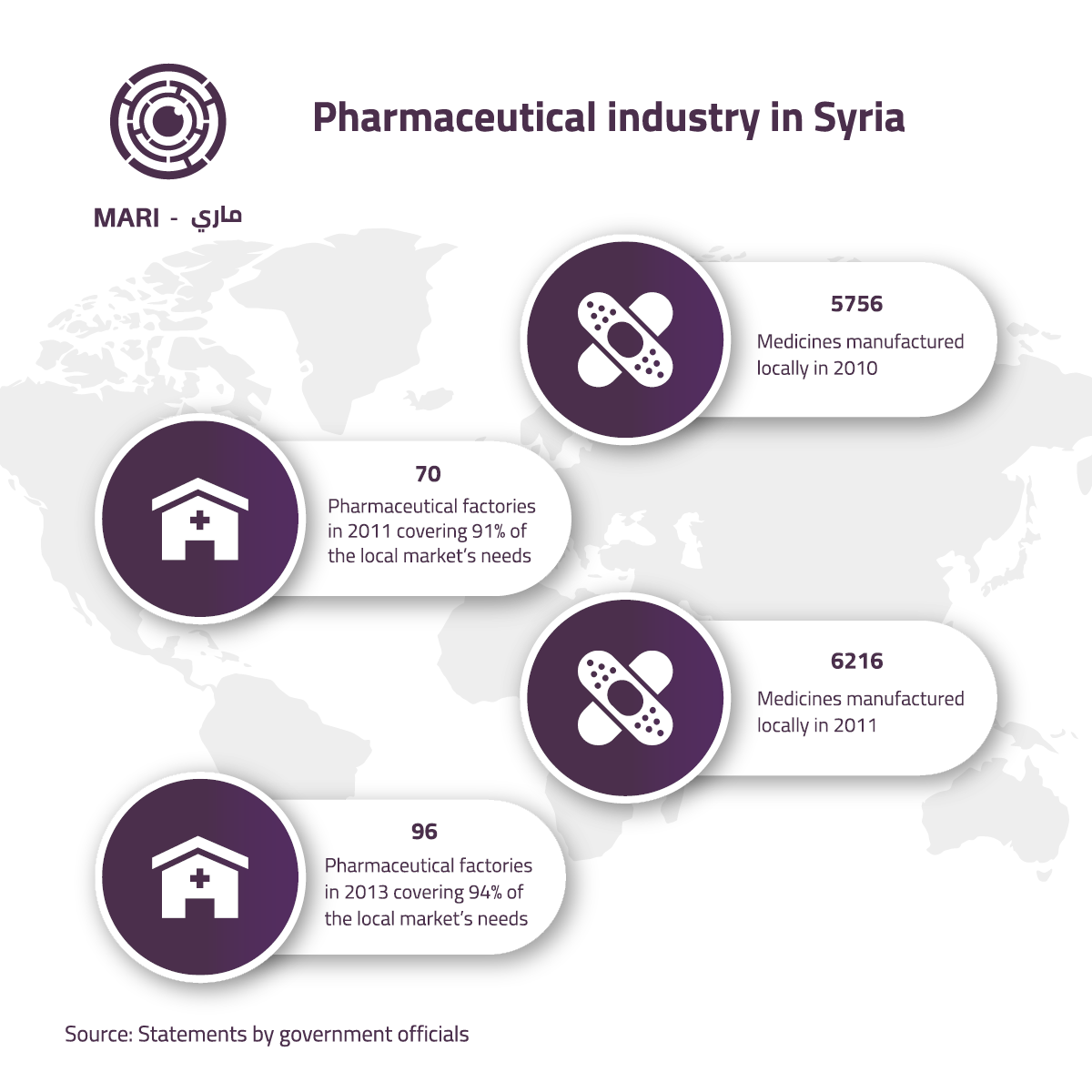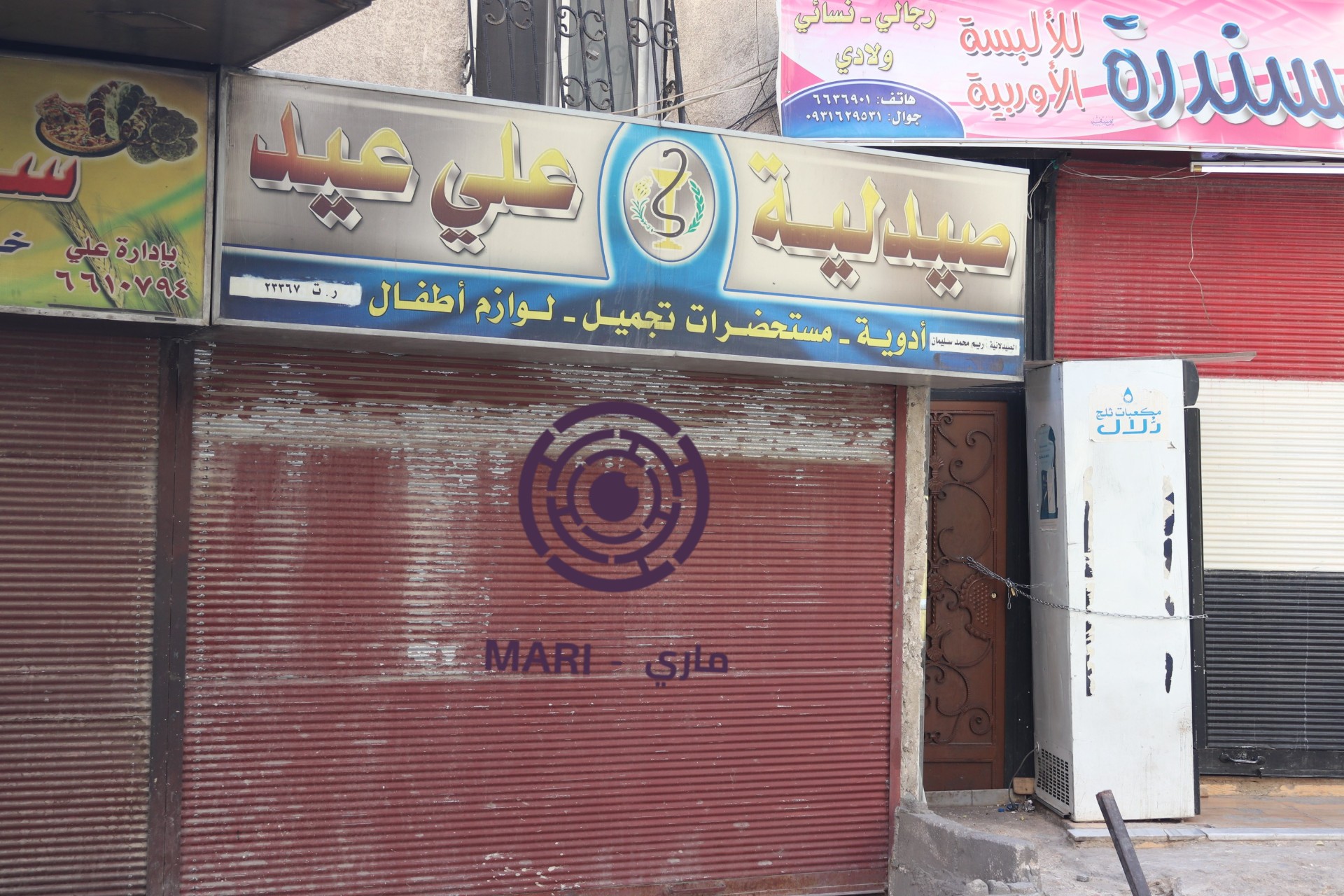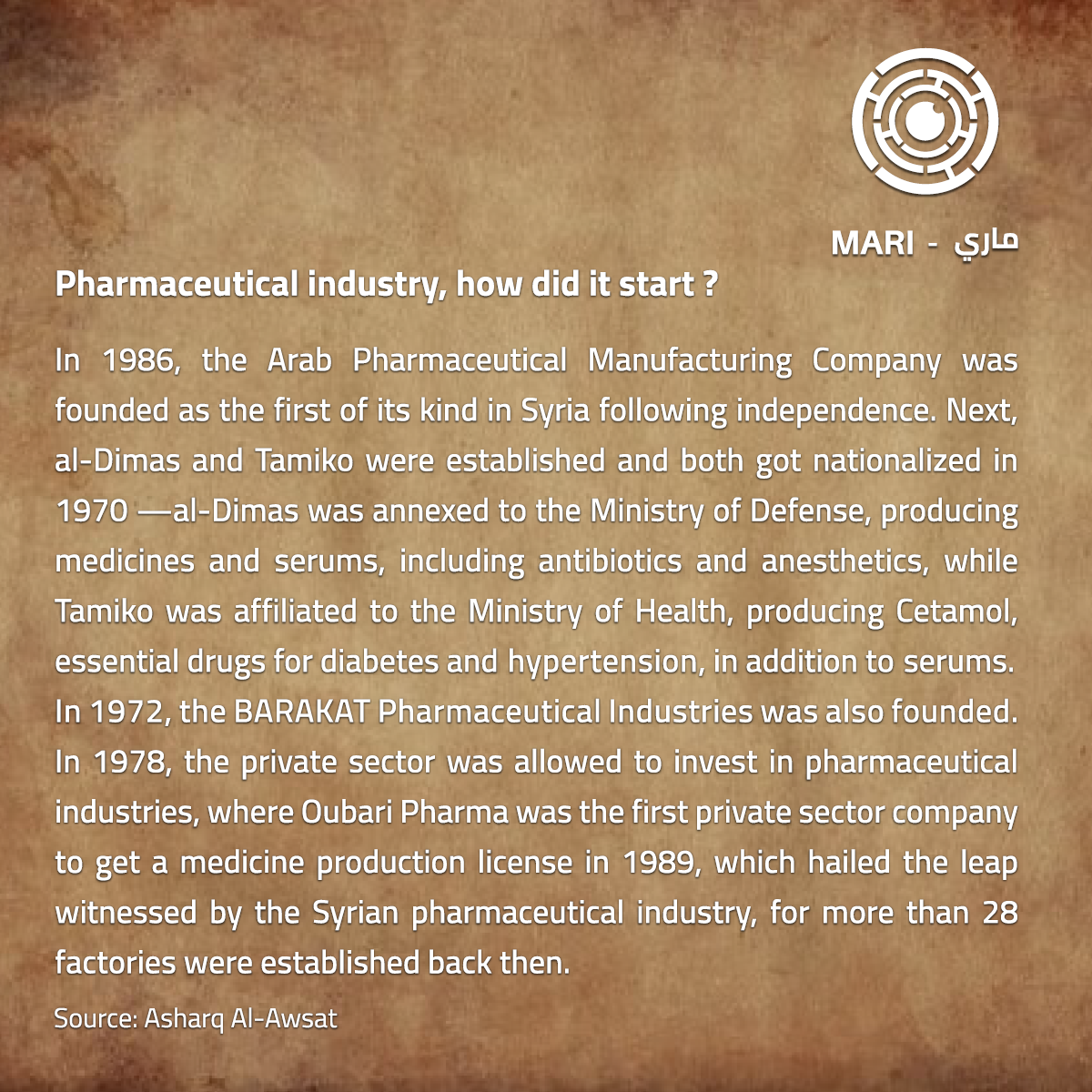DAMASCUS — In Al-Mujtahid Hospital, a beloved wife was left to her own devices on a bed in the care unit, having a chest disease, but not medicine. At the same time, Yahiya, her husband, was gripped by despair, wearing his shoes out on the streets of Damascus, seeking the city’s pharmacies in search of the medicine.
“I have been to over 20 pharmacies in Damascus but could not find the medicine. My wife is dying at the care unit for lack of medicine,” said Yahiya Al-Aref (39), who lives in Harasta, rural Damascus, with his wife and five children.
“We swear to God, we do not have it. They are not distributing it!” That is what people hear as they queue in long lines before pharmacies’ doors in Damascus to get their prescriptions dispensed, a situation bluntly put into words by Wadah Murad, a member of the People’s Council of Syria.
“Drug factories are threatened with closure, once they run out of the raw materials in their possession,” he cautioned on June 2.
“Pharmacies do not have drugs, and factories cannot produce them the way they used to do before, which means that the government is not doing its job. And, should drugs be monopolized, the government again is responsible for that,” Murad said to Mari, holding the Syrian government accountable for manipulating the country’s healthcare system, as it continues to play a pull-push game with pharmaceutical companies’ owners.
Murad did not even blink as he accused the Ministry of Health of “lying,” commenting on the minister’s statement that drugs are available. “No-healthcare for Citizens Ministry,” Murad called the ministry mockingly.
The medicine crisis is aggravating in conjunction with the enforcement of the US-passed Caesar Act, which put into effect today, places the Syrian government, state figures and others maintaining ties with it under a set of economic sanctions.
The crisis has already been wed to the Act in official statements, for a few days ago, the Minister of Health said that the U.S. sanctions “had affected the Syrian citizen, even when it comes to medicine,” though the Act, according to its advocates, avoids penalizing medical and food supplies intended for civilian use.
“Sham” medicine crisis
Since the beginning of June, pharmaceutical industries have been witnessing a monopoly of medicines by drug factories and warehouse owners, aiming to create a drug and health crisis to pressure the Ministry of Health to raise drug prices. Amidst these insecurities, no one is falling victim but the Syrian citizen, as several Damascus-based pharmacists told Mari’s correspondent.
It has been nine years since the war first broke out, resulting in the inflation of the people’s economic suffering and poor living conditions throughout Syria. However, the deteriorating conditions have not rendered Syrians incapable of affording medicines the way they are today. Lately, getting a number of medicines in Syria has become a challenge, for they are either unavailable on pharmacies’ shelves or have recorded a new striking price increase.
Nonetheless, the shortage of medicines, and the pains this crisis is putting Syrians to are not novel. Rather, they have both begun with the precautionary measures the government embarked on to counter COVID-19 in late March. This shortage then swirled out of control, becoming a crisis as different drug formulas went missing from pharmacies while companies refused to produce them, which had a direct impact on people’s lives that worsened further.
On May 20, the government, through the Ministry of Health, raised the prices of 1,400 medicinal products out of 11,800 drug classes, between 60% and 600% each. The new pricing policy adopted the preferential exchange rate of 704 pounds for a dollar, instead of the official price set by the Central Bank of Syria, estimated at 435 Syrian pounds for medicines which raw materials are imported after March 2020.
The correspondent showed up at a dozen pharmacies in different areas in the capital city, and pharmacists’ opinions crossed, attributing the drug shortage to the dispute between the Ministry of Health and pharmaceutical factories, which stopped the process of production in retaliation to the ministry’s refusal to adjust prices in keeping with the hikes in the US Dollar exchange rates—the currency used for importing vaccines and pharmaceutical input raw materials —on the black market.
“Distributors and agents [pharmaceutical companies’ marketing agents] distribute only two or three boxes of each drug formula,” one Damascus-based pharmacist told Mary.
Yahiya al-Aref’s wife was hospitalized for this reason, when her case got critical: “She was on her regular medications, but suddenly the medicine disappeared from shelves, which I was already buying for a high price,” he told Mari.
With a dark tone of humor, Yahiya added: “My house is already an empty shell; it needed just a final stroke, medicine crisis and a price raise, amidst the sea of living tragedies that we are drowning in.”

Jabs and contradictory statements
None of the drug production, distribution and sale officials address the root cause of the problem. The Syrian government, for its part, blames the owners of pharmaceutical companies and drug factories, who in turn say that the government demands that medicines be produced and sold at a loss.
On June 4, the Syrian government stated that it raised drug prices based on raw materials costs, which are priced at the preferential dollar exchange rate of 704 pounds, instead of their former pricing, which was set according to the 435 pounds exchange rate. Manufactures, on the other hand, say: “The ministry is yet tuning the prices in keeping with the official dollar/pound exchange rate, namely 435 pounds.”
On the same day, Nizar Yazaji, minister of health, held a press conference. He stated that, “There is no disruption of medicines, what is lacking might be a few medicine brands, to which there are alternatives, for the ministry grants several factories the license to produce the same medicine.” Yazaji added that, “Drug factories do not have a reason to stop the production process, and the government shoulders the burden of financing the import of raw materials and other supplies.”
However, the minister’s speech went against a statement made by the Director of Medical Affairs at the Ministry of Health, Dr. Razan Slouta. “Some imported raw materials are scarce due to the COVID-19 crisis, and many countries have refrained from exporting raw materials,” she stressed. “The pharmaceutical companies were concerned, but they did not shut down. Instead, they rationed drug sales and dispensation. Furthermore, the price adjustment process usually causes a lag.”
On her turn, Wafaa Kishi, president of the Syrian Order of Pharmacists, attributed the drug crisis to “some citizens’ propensity to stockpile medicines beyond their need.” She accentuated that, “there are enough medicines in Syria, liable to cover the citizens’ demand for a year.”
The President of the Order of Pharmacists in Damascus Alia al-Assa’d, on her turn, admitted that the market is lacking on various drug formulas.
Ambiguous humanitarian crisis
Conducting a thorough process of observation, the correspondent noted that various areas in the Capital Damascus are witnessing unprecedented queuing in front of the yet open pharmacies, given that most pharmacists have either closed their drug stores, refrained from selling medicines or kept them in store till prices are raised. Additionally, operating pharmacies are lacking many drug formulas, such as the ones prescribed for diabetes or patients with hypertension and heart problems, not to mention Cetamol, a medication used for treatment of pain and fever.
Despite the war, overcrowdedness at pharmacies’ doors did not become a familiar sight, for in each area there are several drugstores that never run out of medicines. Today, however, a visit to the pharmacy is a daily errand for patients, given the disruption of medicines, the scarcity of some formulas and the impossibility to obtain others.
To her misfortune, Abeer, who lives in the Al-Baramkeh neighborhood in central Damascus, failed to find both her father’s hypertension medications and her mother’s heart treatment, for the drug formulas they are on are unavailable on the market. “I have been to all the pharmacies in my area but was unlucky to find the needed medicines,” Abeer told Mari. One pharmacist thus advised her to give her father half a 100-gm tablet, since he is on 50-gm tablets. Her mother, nonetheless, had to go untreated, for her medicine was absolutely missing.

Taking a tour around Damascus, passing through its different neighborhoods, the correspondent monitored long lines of agitated people, as they waited before the few pharmacies left open. They stood there to get their daily and life saving medications. Last week, closed pharmacies creeped their way to familiarity, vacuum was all they could offer, bare shelves and display windows. The pharmacists automatically repeated: “I swear to God, none is left,” “that medicine is no longer distributed” or “it just run out” and other phrases, sufficient to worsen the already fallen morale of those who failed to get the medications. In return, people plead with pharmacists: “Cannot you just help me get this drug,” or “where can I find this drug, God bless you!”
Pharmacists and the price pretext
For his part, pharmacist Mu’in Yousef, a resident of Damascus, told Mari that the shortage of some drug formulas stems from local drug factories’ decision to either reduce production or limit the process to a specific number of medicines, given the U.S. dollar’s new recorded hit, as it was exchanged at a rate of 3600 pounds last week, while the Ministry of Health sets up the medicines’ prices according to the official dollar exchange rate, namely 434 pounds, and price inflation continues to influence daily life on all levels.
Meanwhile, pharmacist Ahmed Wahba, another resident of Damascus, believes that the problem lies in the Ministry of Health’s refusal to raise prices as demanded by drug factories, which, for their part, have relinquished production altogether. “The newly priced list of medicines, which contains 1247 drug formulas, does not exist on the market at all,” he told Mari.
The owner of the “Mounir” pharmacy in Damascus stated that, “Factories actually have both medicines and raw materials. But they have stopped the production process in protest against prices. For example, the price of a pack of Infacon is 200 pounds, which “does not cover the packaging costs, neither of the bottle, nor the cardboard box.”
Furthermore, he told Mari that, “The warehouses stopped distributing medicines, and if they choose to distribute them, they present scarce amounts.”
“Most pharmacies sell the medicines in their possession at the same prices,” he said. “The pharmacist cannot raise the price beyond the Ministry of Health’s price lists, because they are in pain and feel ashamed, when people ask them for a lacking medicine.”
Distributors and factory owners
A distribution agent of Pharma Pharmaceutical and Medical Supply Warehouse in Damascus, Anass al-Kouli said: “During the lockdown [which the Syrian government announced as part of anti-Corona measures], our work was affected badly. We could no longer distribute medicines to all pharmacies, which caused a shortage of some medicines. Today, amidst this drug crisis, we did not raise medicine prices that are locally produced, which we distribute to pharmacies on a daily basis.”
“The exchange rates are killing us,” he told Mari, adding that they affected the availability of imported medicines, which prices broke records. “At the same time, many warehouses were reluctant to distribute medicines to pharmacies.”
Rashid Al-Faisal, owner of the IBN Hayyan Pharmaceuticals, said: “The ministry has held a meeting for the owners of companies and factories to dictate its own terms, not to solve the problem,” telling Mari that 80% of his lab’s needs are imported at the black market’s dollar exchange rate.
“Raising the medicines’ import price to the preferential price of 700 pounds does not offer the problem a permanent solution,” he added, stressing that “unless prices are adjusted, the problem will not be solved.”
Moreover, he indicated that his factory did not stop the production process, and that he had imported a million-dollar-value materials, “a million that cannot be recovered through 200 or 300 pounds, which the medicine pack is being sold for.”
Constitutional violations
Articles No. 25, 22 and 23 of the Syrian Constitution state that the government is responsible for the citizen’s health and that “[e]ducation, health, and social services are the basic pillars for building society . . . the state shall guarantee every citizen in cases of emergency and sickness.”
However, the reality is completely different from the one stipulated by the Constitution, for the government allowed the export of locally produced drugs on the condition that this does not impact the local market’s needs. Reality is that the government permitted exports despite the drug crisis the local market has been battling with for months.
On this note, Dr. Issam Al-Takrouri, doctor of Public Law at Damascus University, said: “Allowing the export of medicines funded by subsidized dollar obliges the government to adopt a mechanism that meets the local market’s demand of medicine, such mechanism is an absolute priority, specifically when urgent drugs such as antidepressants are the concern,” in addition to “striking a balance between drug prices and the per capita income, given that some medicine prices have recorded fictitious increases.”
In a Facebook post, Al-Takrouri suggested that, “Pharmaceutical companies should be obligated to supply the local market with a certain percentage of the medicinal items they produce by means of subsidized dollar, in exchange for allowing them to export a certain percentage, ranging between 10 to 30% of the drug supplies they pump into the local market, otherwise they will be subjected to an export ban.”
Like many other Syrians, Yahiya is aware of the severity of the health situation in Syria, given the shortage of medicines and the Ministry of Health’s failure to solve the problem in a way that guarantees that citizens will get the medicines they need and protects them from falling into impotence, the inability at buying medicines, since 83% of Syrians are today below the poverty line.
